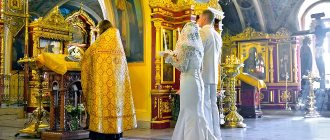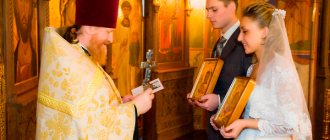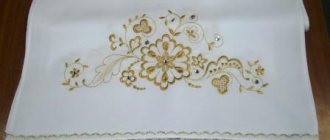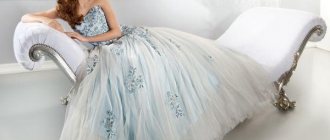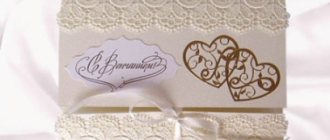It is not so easy for a bride to prepare for a wedding ceremony. This is a special sacred sacrament that must be observed with all strictness. According to church canons, only those couples who are religious and moral can get married. In order for a married couple to be married in a church, it is necessary to appear before the priest, who will or will not give his consent to such a sacrament. If the answer is positive, the spouses should immediately begin preparing for the special event.
Preparation is both spiritual and physical. The young lady begins to think about what image to choose for the sacrament in order to look at the same time beautiful, dignified and permissible from the point of view of church canons.
A very beautiful and comfortable scarf for the temple - easy to sew!
We invite you to sew a beautiful and comfortable scarf for the temple.
What are the benefits of these scarves? They do not fall off the head even when bowing, they cover the shoulders, which is important in the summer, when you want to wear a sundress, but because of the open shoulders you have to give it up, they are very beautiful and effective.
This very beautiful and stylish shawl for the temple is sewn from guipure, scalloped lace fabric, simply from silk and trimmed with matching lace.
The scarves are beautiful and effective! Especially at a wedding, the bride will look incredibly beautiful in such a scarf.
How to sew a scarf for a temple
Consumption:
- With a guipure width of 140-150 cm, from 110-120 cm you will get 2 scarves;
- Lace for this size is 3-3.5 meters (for 1 scarf);
- 1.5-1.6 meters of bias tape to match;
- 1.5 m of thin satin ribbon;
- 2 end caps (or 2 beads).
This scarf was made for an adult, but my five-year-old daughter works as a model, although the scarf looks almost as beautiful on an adult.
Layout plan:
- cut the fabric (140cm wide) in half lengthwise (in advance! The picture shows a plan of the already cut half!!!)
- bend a strip of fabric along its width
- cut off one of the bottom corners (see
photo below) - mark the drawstring
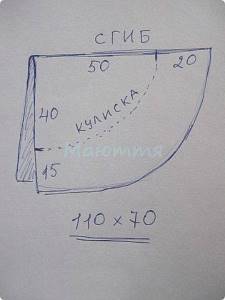
This is how we approximately cut off one of the lower corners on the fabric
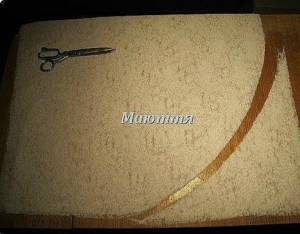
This is after they trimmed the perimeter with lace and sewed on the drawstring (the photo, as always, is uneven), but in real life everything is smooth!
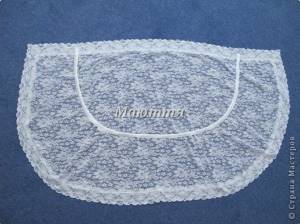
Lace and guipure are elastic, so I sewed them on a cover stitch, but you can also use a double needle
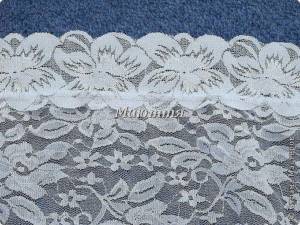
- I cut off the lace at the corners, and then sewed it with a small overlapping zigzag, then cut off the excess
- We sew the drawstring from the inside out, although on another scarf I sewed it from the face - it also turned out well
- We thread a satin ribbon into the drawstring, and put large beads on the ends of the ribbon and tie knots
They always ask for sizes for children's scarves. Children, of course, are different, and it depends on the width of the lace with which you will trim the scarf, but here’s roughly what I drew. 80 cm of guipure will make THREE scarves.
How to sew a scarf for a temple video master class:
Source
Source: https://sozdavaisam.ru/ochen-krasivyj-i-udobnyj-platok-dlya-hrama-shetsya-legko
Fabric calculation
The amount of material depends on the style of the scarf. For snoods, products that cover the head, less fabric will be required compared to models that fall over the shoulders and chest. So, for a beautiful Don scarf for adults you need:
- piece of fabric 120 x 140 cm;
- lace for finishing edges - 3 m;
- satin ribbon - 150 cm;
- drawstring - 120 cm;
- a pair of beads for fixing on the ends of the ribbons.
Depending on the volume and splendor of the scarf, the specified amount of materials is enough for one or two products. Therefore, a piece of fabric is divided into 2 even pieces with parameters 140 x 55 cm.
To sew a scarf for a child, you need to measure the circumference of his head. If the size is 48 cm, another 40 cm is added to the resulting value to make the ties. The edges are finished with a hem seam with a closed cut. First, 0.5 cm is folded, ironed, folded a second time and stitched with a deviation from the edge of no more than 0.2 cm.

Shawl for the temple... Great idea - beautiful and comfortable!
I found this super idea “How to sew a scarf for a temple” from a Mayutta needlewoman. I think it may be useful to many!
Further words of the Author:
- they do not fall off the head even when bowing,
- cover the shoulders, which is important in the summer, when you want to wear a sundress, but because of the open shoulders you have to give it up
- very beautiful and effective! Especially at a wedding, the bride will look incredibly beautiful in such a scarf.
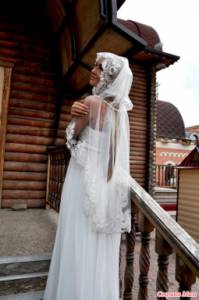
Such a scarf is sewn from guipure, fiston lace fabric, or simply from silk and trimmed with appropriate lace.
Consumption: with a guipure width of 140-150cm, from 110-120cm you will get 2 scarves; lace for this size is 3-3.5 meters (for 1 scarf); 1.5-1.6 meters of bias tape to match; 1.5 m of thin satin ribbon;
2 end caps (or 2 beads)
This scarf was sewn for an adult, but my five-year-old daughter works as a model))), although the scarf looks almost as beautiful on an adult
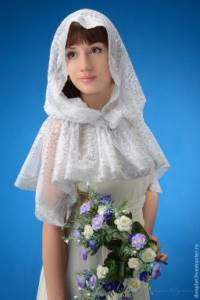
1) cut the fabric (140cm wide) in half lengthwise (in advance! The picture shows a plan of the already cut half!!!) 2) bend the strip of fabric along the width
3) cut off one of the lower corners (see photo below)
4) mark the drawstring like this, approximately cut off one of the lower corners on the fabric. This is after we have trimmed the perimeter with lace and sewn the drawstring (the photo, as always, is uneven))), but in real life - everything is smooth!!!) lace and The guipure is elastic, so I sewed it on an open stitch, but you can also use a double needle to cut off the lace at the corners, and then sew it with a small zigzag overlapping, then cut off the excess
To read further, go to next page
Source: https://apelsin-ka.ru/platok-dlya-hrama-super-ideya-krasivo-i-udobno/
A flowing scarf for the temple - we sew according to the pattern with our own hands
When visiting a temple, every woman should be dressed appropriately. In particular, you need to pay attention to the headdress - women should only enter the Orthodox Church with their heads covered.
For these purposes, they often use a light chiffon scarf or a regular scarf, however, if you are a believer and pay attention to this, we recommend sewing a simple flowing scarf for the temple yourself. Its pattern is offered below.
To make a scarf you will need a minimum of time and materials, and the result will exceed all expectations!;)
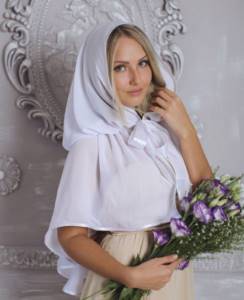
What fabric is suitable for a temple scarf?
To create a flowing scarf, any light, breathable fabric is suitable. We recommend paying attention to the following options:
- guipure;
- silk,
- satin;
- organza;
- scalloped lace fabric.
It is not recommended to select fabrics that are too transparent, since, according to generally accepted standards, a woman in a temple should look modest and discreet. An exception is weddings: scarves made from thin, translucent materials are allowed here.
It is important to remember that the hood should cover the head and not be worn on it like a hat. In addition, the chest and shoulders should also be covered.
How to choose the color of the cape
It is extremely important to choose the right color of the cape-hood for the temple.
The white color symbolizes the miraculous light of God. It is appropriate for weddings, Christmas, Epiphany, Ascension and Transfiguration. A white cape is also worn for Easter services and the sacrament of baptism.
The black color of the scarf is the complete opposite of white. Such a headdress should be worn for repentance, renunciation of temptations, during fasting or mourning.
Colored capes can also be appropriate. For example, green - on Trinity, blue - on the days of veneration of the Mother of God.
Calculation of fabric for sewing a flowing scarf
Below we offer only approximate calculations for cutting one headdress for church. With a roll width of 1.4-1.5 meters, you will need at least 50-60 centimeters of fabric per cape. To sew a children's cape, the pattern proposed below should be reduced by 5-10 centimeters.
Flowing scarf in the temple: pattern
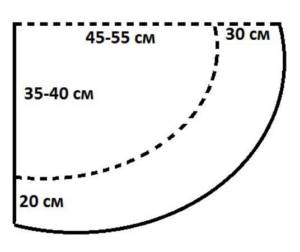
How to sew a scarf for a temple with your own hands: master class
First, cut off the required amount of fabric for sewing the cape. Next, you need to fold the resulting segment in half and mark it as shown in the diagram.
The dotted line marks the place where the drawstring will be sewn in; below (20 and 30 cm) there is a cape, which, falling, will cover the shoulders and chest. The cape gradually lengthens - from the chest to the center of the back. If desired, it can be lengthened or shortened.
Having transferred all the lines to the fabric, we cut it out, not forgetting about the seam allowances.
There are two ways to sew a cape
The first method is simple, without a drawstring. In this case, we will need to carefully bend the edges by 2-3 millimeters and sew them on a typewriter, and run the lace prepared in advance along the bottom.
The second method is more difficult. We sew the drawstring from the wrong side along the marked line and stretch a satin ribbon or braid into it to match the cape, 50-70 cm long.
How to decorate a finished cape
A scarf sewn according to our master class is suitable for both everyday church services and holidays. It is important to remember that the Orthodox Church does not approve of jewelry, so it is important not to overdo it either with the brightness of the color of the product or with its decor. You can decorate such a cape with a small brooch or beads/beads along the bottom of the product.
Source: https://portniha.com/dlya-zhenshhin/nispadayushhij-platok-v-xram.html
Selection of material and model
The main principle of choosing a scarf is ease of use. It should not fall off the head, become untied, or distract from the service. Light openwork fabrics are suitable for young girls: guipure, lace, organza, tulle. Older women should pay attention to dense materials: silk, satin, cotton.
Transparent fabrics are only relevant for wedding ceremonies.
The color of the products is of great importance. A church scarf for holidays should be light, monochromatic, perhaps a discreet pattern. During fasting and mourning days, it is possible to use only dark shades: black, brown. White models will be an excellent addition to the bride’s image, appropriate for the sacrament of Baptism, Christmas, Epiphany, and Ascension.
The Easter scarf can be red. Blue is used on days of veneration of the Mother of God, green on Trinity. Multi-colored scarves are designed to bring a special atmosphere to religious customs. It is necessary to carefully ensure that the selected scarf is appropriate for a particular event.
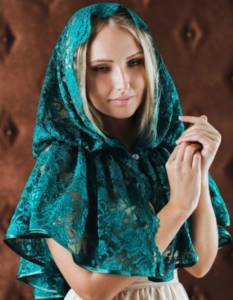
Guipure
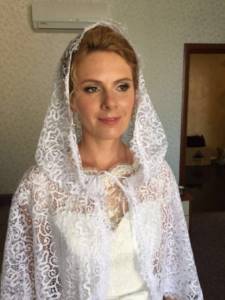
Lace
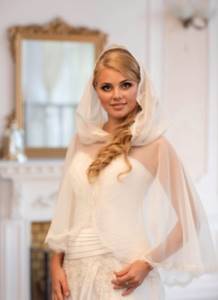
Organza
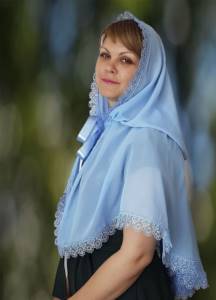
Tulle
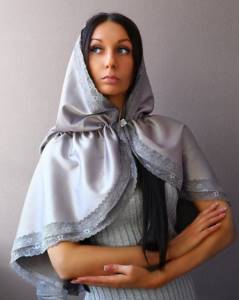
Atlas
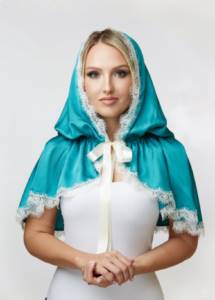
Silk
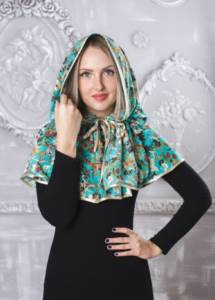
Cotton
A church scarf can be a stylish addition to a woman's look. Today there are different styles of the product. You can make the following models with your own hands:
- Don;
- hood;
- snood;
- shawl;
- scarf stole;
- headscarf.
A wedding scarf looks impressive, made in the form of a long, voluminous cloak with a cape over the head. The model will appeal to romantic natures.
For sewing you will need a piece of fabric with a suitable texture and color. From tools and consumables, you need to prepare a set of needles, threads, a sewing machine, and pins. Beads, beads, braid, ribbons, and buttons are used as decoration.
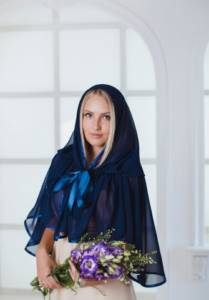
Donskoy
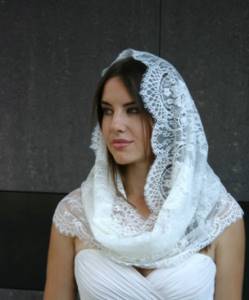
Kapor
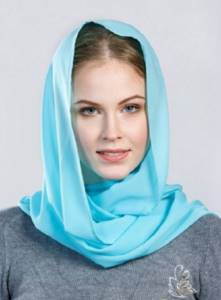
Snood
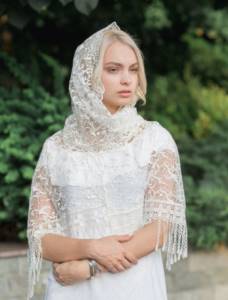
Shawl
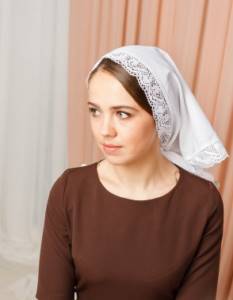
Kerchief
Choosing a scarf for a wedding: advice from stylists and instructions on how to sew it yourself
The wedding scarf is a traditional accessory of the bride’s outfit, the most strict and canonical, because a woman in the Orthodox Church must cover her head in the canopy of the temple.
There is, of course, another option - a veil, but only innocent girls can use it, and weddings increasingly take place several years after the secular registration of marriage, which makes choosing a veil impossible.
In addition, scarves are distinguished by a special, chaste beauty, which perfectly emphasizes the sacredness of the moment.
Features of the wedding
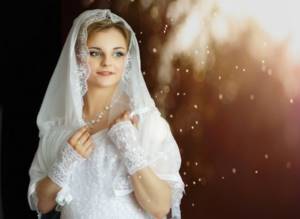
Like any church ritual, a wedding has some requirements, including the dress code of all those present, and especially the bride.
Women, in principle, should not come to the temple with their heads uncovered, in conspicuously revealing clothing - bare shoulders, neckline, back, knees. Avoid fabrics that are too fluffy - synthetics are a fire hazard, and there will be a lot of candles around.
Refrain from frilly jewelry, high heels and bright makeup. They are inappropriate during the sacrament.
Important! Under no circumstances should the bride wear lipstick. Even colorless glitter is prohibited. You will kiss the images, and there should be no lipstick marks left on them.
Women traditionally come to church with their heads covered. Most often it is a scarf, festive or ordinary. Unlike a veil, which can only cover the head of an innocent girl, a scarf suits everyone. But this is not the only reason for its popularity.
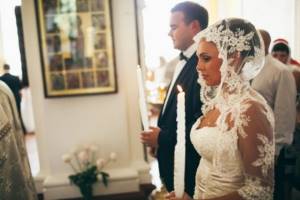
Types of hats
Most often, brides prefer the white color of the accessory or its more delicate shades - ivory, champagne, cream. However, the Orthodox Church allows other colors, the main thing is that they are light, gentle, pastel. Bright or dark variations - cherry, black, purple - are best left for another holiday.
Source: https://wedus.online/tradisii/venchanie/odezhda/platok.html
Removing the veil at a wedding: history and tradition
One of the most touching moments at a wedding is the removal of the veil. This is a whole ritual for which you need to prepare one way or another. This moment should be romantic, emotional, sensual. It takes place under the close attention of all guests of the holiday. Therefore, it is worth approaching it with all responsibility and understanding. But where did this tradition even come from?
Origin of the ritual
Centuries earlier, there was another ritual - on the wedding day of the newly-made bride, her long braid was carefully unraveled, after which the wreath was immediately removed. After all, the braid was considered the main symbol of girlhood. Previously, women who were married were required to tie a scarf on their heads. Time passed, and this tradition changed significantly - now the wreath was replaced with a veil, but tying a scarf remained. So the ritual of removing the veil is deeply rooted in our history, although it has been partly modernized.
How to remove a veil during a wedding
Actually, there are 3 options:
- First option: the mother-in-law takes off the veil. This symbolizes that the girl is accepted into their friendly family and thereby recognized as the main assistant in the family.
- Second option: the mother takes off the veil. Thus, she symbolically hands over the bride to her son-in-law.
- Third option: the groom takes off the veil. This option is the rarest. Not only because, according to tradition, the groom did not do this, but simply because he, unknowingly, can ruin the bride’s hairstyle by getting tangled in all these hairpins and curls.
Almost always, whoever removes the bride’s veil also ties a scarf around her head. But there may be another scenario. For example, a mother takes off her veil, and the mother-in-law knits a scarf. This seems to indicate that the mother is accompanying her daughter to her husband’s family.
Despite the fact that the ritual itself is very sensual and to some extent even sad, it should not take place in complete silence. A wonderful addition will be light romantic music that will accompany this entire process. If you want to give the ceremony even more significance, guests can stand around the young couple with candles in their hands, and it is best to dim the ambient lighting.
Usually, a chair is placed in the very center of the room where the celebration takes place and the bride sits on it. Alternatively, she can sit on the groom’s lap. Guests can even sing a wedding folk song, but this moment needs to be discussed and prepared in advance. A more classic option is for the presenter to read poetry.
Dance with a veil
This is another old tradition that immediately follows the removal of the veil. The young wife takes the veil in her hands and dances in turn with all the unmarried girls present, holding it above their heads. Thus, she attracts family life to them. They say that other girls do not need to put a veil on their heads during this dance. There may also be a scenario where a bride with a veil dances with unmarried guys. Only in this case she places the veil on the guys’ shoulder. Only after the end of the dance with the veil is the ceremony considered completed. And at this moment the newlyweds can already leave the celebration. The guests stay and continue to celebrate. Although nowadays the young also celebrate until the very end.
How to choose a scarf for the bride
Previously, ordinary traditional scarves were used. Now this is completely unnecessary. The scarf can be replaced with a lace scarf, guipure or chiffon scarf. Or even a piece of mesh fabric decorated with embroidery.
It is strongly recommended not to put off purchasing a scarf for too long. Still, it should be harmoniously combined with the wedding dress and generally fit the image of the bride. In addition, you definitely need to try it on, try tying it in several ways to choose the optimal one. It is necessary that the bride looks beautiful even after removing the veil.
What other features are there for removing a veil at a wedding?
You should not greatly extend the process of removing the veil and tying the scarf. The fact is that at this moment many, if not all, women present may begin to cry. Therefore, there is no need to turn a festive event into sobs - it is better to speed up. For the same reason, this ritual occurs towards the end of the entire event.
From this tradition it is quite possible to make an original performance. For example, if the mother-in-law ties a scarf, the bride can rip it off once or twice, and then, expressing her humility, leave it. Of course, if you don’t like this, you can do everything traditionally.
By the way, now this ritual is not performed at all weddings. But if you still decide to include it in the program, make sure that the veil on your hair stays well enough, but at the same time it can be easily removed. Otherwise, you are guaranteed to have a ruined hairstyle.
Veil after the wedding
Under no circumstances should the veil be sold, given or borrowed. She needs to be left in her family. In the future, when a child is born, it is the veil that is traditionally used to cover the baby in the stroller while walking outside. It is believed that this is the best way to protect a child from the evil eye and the like.
Remember that only you can decide which method of removing the veil to choose, what sound will be used at this moment, and whether this tradition will be observed at your special occasion.
All about organizing your own wedding
Shawl for the temple. Great idea - beautiful and convenient!
1:504 1:509
I found this super idea “How to sew a scarf for a temple” from a Mayutta needlewoman. I think it may be useful to many!
1:702
Further words of the Author:
1:742
- they do not fall off the head even when bowing,
- cover the shoulders, which is important in the summer, when you want to wear a sundress, but because of the open shoulders you have to give it up
- very beautiful and effective! Especially at a wedding, the bride will look incredibly beautiful in such a scarf.
2:1804
Such a scarf is sewn from guipure, fiston lace fabric, or simply from silk and trimmed with appropriate lace.
2:222
Consumption: with a guipure width of 140-150cm, from 110-120cm you will get 2 scarves; lace for this size is 3-3.5 meters (for 1 scarf); 1.5-1.6 meters of bias tape to match; 1.5 m of thin satin ribbon;
2 end caps (or 2 beads)
2:587
This scarf was sewn for an adult, but my five-year-old daughter works as a model))), although the scarf looks almost as beautiful on an adult
2:865 2:870
Layout plan.
1) cut the fabric (140cm wide) in half lengthwise (in advance! In the picture there is a plan of the already cut half!!!) 2) bend the strip of fabric along the width 3) cut off one of the lower corners (see photo below)
4) mark the drawstring
3:17983:4
This is how we roughly cut off one of the bottom corners on the fabric
4:621 4:626
This is after they trimmed the perimeter with lace and sewed on the drawstring (the photo, as always, is uneven))), but in real life everything is smooth!!!)
5:1366 5:1371
lace and guipure are elastic, so I sewed them on an open stitch, but you can also use a double needle
6:20546:4
I cut off the lace at the corners, and then sewed it with a small overlapping zigzag, then cut off the excess
7:686 7:691
We sew the drawstring from the inside out, although on another scarf I sewed it from the face - it also turned out well
8:1376 8:1381
this is how the drawstring looks from the front side in this case
9:2006 9:4
thread a satin ribbon into the drawstring
10:586 10:591
I have end caps with a large hole, and the knot of ribbon slipped into it easily. That's why I came up with this design with a bead
11:1351 11:1356
model wearing a scarf
13:241713:4
neck tie
13:53 13:58
behind. By the way, I’m planning to sew such scarves for my little ones this summer - they’re so beautiful!
14:731 14:736
And here’s what a children’s scarf looks like on a child.
14:835 14:840
I inserted an elastic band into the drawstring and secured it. And the scarf is fastened with a button so that the child does not accidentally tighten the ribbon around his neck.
15:158715:4
They always ask for sizes for children's scarves.
17:1131
Children, of course, are different, and it depends on the width of the lace with which you will trim the scarf (and in general, will you?))) but here is approximately what I drew. 80 cm of guipure will make THREE (!!!) scarves
17:1460 17:1465
18:1976
By the way, the owner of the trademark of this scarf found me and threatened me with court and a huge fine if I did not delete this post... So, I got the cut right 100%!)))))
18:285 18:290
So, girls, take advantage. In an online store, exactly the same scarf made from exactly the same guipure costs 2,700, but for us it will cost 300 rubles, give or take. 9-10 times cheaper!!!!
18:582 18:587 20:1599 20:4
Added on August 11, 2015: Lately I’ve been getting comments on this post from anonymous people. And everyone, like a carbon copy, with irritation (if not anger), tells me that if you buy guipure and lace in a store, it will be more expensive than buying a ready-made scarf.
20:467 20:472
Gentlemen, don't bother! I will not delete or change this post, because... many of my guests have found it useful or will find it useful in the future! Look at the number of people who have favorited this post!
20:823
So, anonymous gentlemen, don’t try, I won’t answer you anymore!
20:955 20:960
added: March 2021. The cost today is as follows: guipure 380 rubles: 110cm = 418 rubles for TWO scarves, one = 210 rubles
20:1160
Lace 80 RUR: 350cm = 280 RUR. Bias binding 9 RUR: 1.5 m = 14 RUR. Satin ribbon 4 rubles: 1.5m = 6 rubles. End caps 6 rubles: 2 pieces = 12 rubles
20:1371
We don’t count the threads)) Total: 520 rubles - the cost of an adult scarf. But, by the way, you can find lace cheaper on the Internet.
20:158320:4 22:1018 22:1023
Source
22:1045
Source: https://jenskiymir.com/rukodelie/shite/1643-platok-dlya-hrama-super-ideya-krasivo-i-udobno.html
Easter scarf for the temple. MK
What are the benefits of these scarves? 1) they do not fall off the head even when bowing, 2) they cover the shoulders, which is important in the summer, when you want to wear a sundress, but because of the open shoulders you have to give it up 3) they are very beautiful and impressive! Especially at a wedding, the bride will look incredibly beautiful in such a scarf. Such a scarf is sewn from guipure, fiston lace fabric, or simply from silk and trimmed with appropriate lace. Consumption: with a guipure width of 140-150cm, from 110-120cm you will get 2 scarves; lace for this size is 3-3.5 meters (for 1 scarf); 1.5-1.6 meters of bias tape to match; 1.5 m of thin satin ribbon; 2 end caps (or 2 beads)
This scarf was sewn for an adult, but my 5-year-old daughter works as a model))), although the scarf looks almost as beautiful on an adult
Layout plan. 1) cut the fabric (140cm wide) in half lengthwise (in advance! In the picture there is a plan of the already cut half!!!) 2) bend the strip of fabric along the width 3) cut off one of the lower corners (see photo below)
4) mark the drawstring
This is how we roughly cut off one of the bottom corners on the fabric
This is after they trimmed the perimeter with lace and sewed on the drawstring (the photo, as always, is uneven))), but in real life everything is smooth!!!)
lace and guipure are elastic, so I sewed them on an open stitch, but you can also use a double needle
I cut off the lace at the corners, and then sewed it with a small overlapping zigzag, then cut off the excess
We sew the drawstring from the inside out, although on another scarf I sewed it from the face - it also turned out well
this is how the drawstring looks from the front side in this case
thread a satin ribbon into the drawstring
I have end caps with a large hole, and the knot of ribbon slipped into it easily. That's why I came up with this design with a bead
neck tie
Here is a scarf on an adult.
And here’s what a children’s scarf looks like on a child.
I inserted an elastic band into the drawstring and secured it. And the scarf is fastened with a button so that the child does not accidentally tighten the ribbon around his neck.
They always ask for sizes for children's scarves. Children, of course, are different, and it depends on the width of the lace with which you will trim the scarf (and in general, will you?))) but here is approximately what I drew. 80 cm of guipure will make THREE (!!!) scarves
By the way, the owner of the trademark of this scarf found me and threatened me with court and a huge fine if I did not delete this post... This means that I got the cut right 100%!!!!))))) So, girls, take advantage of it. In an online store, exactly the same scarf made from exactly the same guipure costs 2,700, but for us it will cost 300 rubles, give or take. 9-10 times cheaper!!!!
Added on August 11, 2015: Lately I have been receiving comments on this post from anonymous people or from unregistered users. And everyone, like a carbon copy, with irritation (if not anger), tells me that if you buy guipure and lace in a store, it will be more expensive than buying a ready-made scarf.
Gentlemen, don't bother! I will not delete or change this post, because... many of my guests have found it useful or will find it useful in the future! Look at the number of people who have favorited this post!
So, anonymous gentlemen, don’t try, I won’t answer you anymore!
added: March 2021. The cost today is as follows: guipure 380 rubles: 110cm = 418 rubles for TWO scarves, one = 210 rubles
Lace 80 RUR: 350cm = 280 RUR. Bias binding 9 RUR: 1.5 m = 14 RUR. Satin ribbon 4 rubles: 1.5m = 6 rubles. End caps 6 rubles: 2 pieces = 12 rubles
We don’t count the threads)) Total: 520 rubles - the cost of an adult scarf. But, by the way, you can find lace cheaper on the Internet.
Source: https://stranamasterov.ru/node/759488
